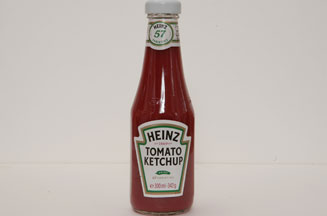
Heinz Tomato Ketchup, one of the UK's truly iconic food brands, is battling to retain share as cash-strapped consumers turn to own-label alternatives.
According to Datamonitor, own-label accounted for 41% of all grocery sales in the year to the end of July, up from 38.2% in 2008. While some brands, such as Hovis, have grown share with the help of high-profile marketing campaigns, the lure of own-brand ketchup has proved too tempting, to the detriment of Heinz Tomato Ketchup's sales.
In the four weeks to 11 July, the brand's share dropped to 74.7%, from 79.9% over the same period in 2008, according to AC Nielsen.
Heinz Tomato Ketchup, launched 133 years ago, was originally positioned as a convenience food for housewives. Prior to the recession it emphasised its naturalness with ads depicting a growing plant and tomato slices.
However, much of its marketing support this year will be as part of joint campaigns for the Heinz brand. A press and outdoor push now running, for example, promotes both ketchup and HP sauces as perfect accompaniments to barbecues. In October, Heinz also plans to run a campaign backing its entire brand portfolio, using the strapline 'It has to be Heinz'.
So how can Heinz's Ketchup get its bottle back? We asked Richard Huntington, director of strategy at Saatchi & Saatchi, which handles advertising for General Mills, and consultant Andrew Marsden, who has worked at Unilever, HP Foods and Britvic.
Richard Huntington director of strategy, Saatchi & Saatchi
The New Yorker of 6 September 2004 included a notable essay, by writer and speaker Malcolm Gladwell, which documents the way the ketchup market has been dominated by Heinz for more than a century.
Remarkably, the brand has done this with a single universal product that meets everyone's needs.
This is because Heinz has achieved absolute perfection in its delivery of the sharp, savoury flavours that are characteristic of ketchup.
This is the principal reason that there is no gourmet ketchup market, as there is with other condiments such as mustard. You simply can't make ketchup better than Heinz.
So why on earth is the brand currently caught in a differentiation trap using rational ingredients stories to plead with consumers that its price premium is justified?
There is only one ketchup worthy of the name. The others, whether branded or own-label, are ersatz attempts to match the magic formula. They represent the dictionary definition of a false economy.
Remedy
- Engage people with their hearts and not their heads. Heinz Tomato Ketchup is a legend sitting on their kitchen table, not a commodity condiment.
- Celebrate the flavour perfection and mystique of the product - this is not about ingredients, but the magical recipe.
- Fight this battle from the high ground with disdain for copycat ketchups.
- Expose the false economies of private-label for what they are, shortchanging your family's taste buds for the sake of saving a few pence.
Andrew Marsden consultant, Andrew Marsden Consultancy
To generate higher volumes and more consumer traffic, retailers are putting unprecedented pressure on brand owners to reduce their prices.
If brands cannot express their points of difference over own-label, then these pure price tactics will win.
So what steps does an iconic brand like Heinz take to make it more robust in its consumers' eyes? Very careful ones. Heinz is looking tired, and it has apparently lost its way; it does not seem to stand for anything. Here is a brand redolent with the traditional values of childhood, and the universal 'red gravy' of youth that gets kids to eat their dinners, peas and all.
We know it also faces the healthy-eating lobby, but let's get this into proportion. People are still eating chips, bacon, burgers, sausages and fish fingers, even if they now have healthier formulations and are often grilled.
Apparently reacting to this, Heinz has cluttered its 'tombstone' label with a plethora of disorganised claims about the product, such as 'no artificials, thickeners or gluten', money-back guarantees, and assurances that it is vegetarian.
Remedy
- When the pressure is on, pay attention to the two Vs - value and values.
- Stand for something and own the category. Heinz's home territory is making good, honest food for kids.
- Simplify the claims. Heinz Tomato Ketchup is made purely of tomatoes, vinegar, some sugar, salt and herbs. Take an assumptive position andstate 'Pure and simple' or 'Originaland best'.
- Own a core use, such as chips, and shout about it. It may encourage people to avoid cheap alternatives.


